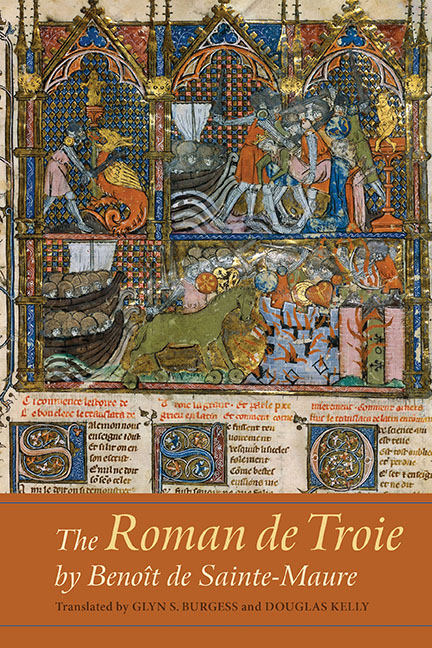Book contents
- Frontmatter
- Contents
- Dedication
- Preface and Acknowledgements
- Introduction
- A Note on the Translation
- Outline of the Roman de Troie
- The Roman De Troie
- Prologue
- Overview of the Plot
- Part One Causes and Effects
- Part Two The Trojan War
- Part Three Settling Scores and Surviving
- Appendix I Notes on Some Common Words in the Roman de Troie
- Appendix II Manuscripts of the Roman de Troie
- Bibliography
- Indexes of Personal and Geographical Names
- Index of Personal Names
- Index of Geographical Names
- Miscellaneous Endmatter
Prologue
from The Roman De Troie
Published online by Cambridge University Press: 15 February 2018
- Frontmatter
- Contents
- Dedication
- Preface and Acknowledgements
- Introduction
- A Note on the Translation
- Outline of the Roman de Troie
- The Roman De Troie
- Prologue
- Overview of the Plot
- Part One Causes and Effects
- Part Two The Trojan War
- Part Three Settling Scores and Surviving
- Appendix I Notes on Some Common Words in the Roman de Troie
- Appendix II Manuscripts of the Roman de Troie
- Bibliography
- Indexes of Personal and Geographical Names
- Index of Personal Names
- Index of Geographical Names
- Miscellaneous Endmatter
Summary
Solomon teaches us and tells us, and one reads this in his writings, that no one should hide what he knows. Rather one should make it public so that it becomes profitable and honourable, for this is what our ancestors did. If those who invented the division of the seven arts and wrote great books about them had remained silent, as well as the philosophers who composed treatises that provide instruction for everyone, we would truly now be leading foolish lives and living like beasts. We would not even be able to distinguish between knowledge and folly, nor differentiate among them. These men will always be remembered and renowned for their great learning, for knowledge that is not made known is quickly forgotten and lost. Whoever possesses learning, but does not teach or communicate what he knows, cannot fail to be forgotten. Knowledge that is communicated germinates, flowers and bears fruit. You should be aware that things often improve for whoever desires to learn and makes an effort to do so. No one can hear, know or remember too much that is good. Nor should anyone hesitate to do or teach what is good. Whoever is more knowledgeable should achieve more. No one should shirk this task. That is why I wish to apply myself to beginning a work of history. I would like to translate it from the Latin in which I find it, providing I have sufficient intelligence and skill, into the French vernacular so that those who are ignorant of Latin can enjoy it in French. The history is most noble and grand, and it treats of a great enterprise and great deeds. The destruction of Troy has been related in many diverse ways, but the truth of the matter is rarely heard. (1–44)
Homer, who was a wonderful cleric, wise and learned, related the destruction, the great siege and the reason why Troy was deserted in such a way that it was never again repopulated. But his book does not tell the truth, for we know for certain and without doubt that he was not born until a hundred years after the great expedition was assembled.
- Type
- Chapter
- Information
- The Roman de Troie by Benoît de Sainte-MaureA Translation, pp. 43 - 44Publisher: Boydell & BrewerPrint publication year: 2017

